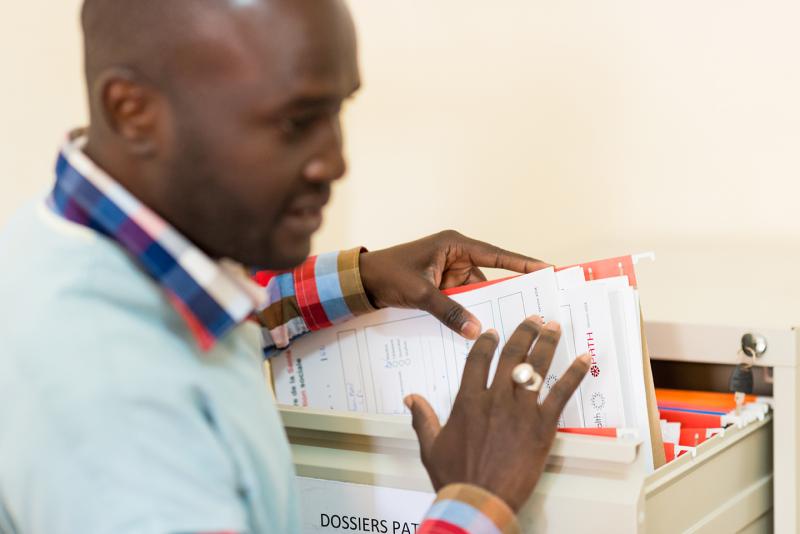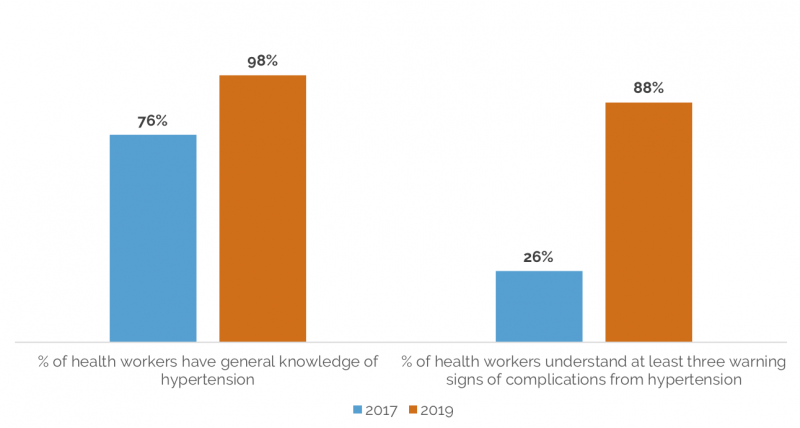Where We Work
See our interactive map


“Before, when someone would come in with symptoms of hypertension, I didn’t know exactly how to handle it—I would do whatever I could to help the person or just refer them to another facility.” —Abdoulaye Ndao, head nurse at the Yoff Ndenatte Health Center in Dakar. Photo by Clément Tardif for IntraHealth International.
During interviews with almost 2,000 health workers and clients in Dakar, Senegal, IntraHealth International found that some 40% of health workers had not been trained to care for clients with hypertension, and 83% of clients who did not have hypertension knew no more than a single warning sign. But a 2019 evaluation reveals significant progress in under two years.
The results from our 2017-2018 situational analysis uncovered gaps in hypertension care and prevention in Dakar, including insufficiencies in equipment, hypertension management skills, and patient education.
Those results helped guide the Better Hearts Better Cities initiative in Senegal—implemented in partnership by IntraHealth, PATH, and the local health authorities—which is part of a global urban health initiative in run by the Novartis Foundation. Its goal is to improve the quality of hypertension management and reduce cardiovascular morbidity and mortality in Dakar.
Hypertension is a dangerous precursor to and prime risk factor for heart disease and stroke, which is now the fifth-leading cause of death in Senegal. The World Health Organization estimates that 42% of all deaths in Senegal are caused by noncommunicable diseases (NCDs) like hypertension. Throughout sub-Saharan Africa, the incidence of stroke has increased 46% since 1990.
In some cities, the prevalence of hypertension is as high as 40%.
“When I was starting out as a young doctor here in Senegal, noncommunicable diseases were thought to be a thing for rich people,” says Joseph Barboza, a physician in Senegal and director of IntraHealth’s Better Hearts Better Cities team in Dakar. “It used to be infectious diseases like measles, malaria, and meningitis that brought people to the emergency room. Now most of those emergencies are caused by NCDs, usually hypertension. In some cities, the prevalence of hypertension is as high as 40%.”
Since its beginning in Dakar in 2017, Better Hearts Better Cities has helped train and provide supportive supervision to 667 health workers across three districts in the city. And it’s paying off. A July 2019 evaluation* found strong improvements in hypertension awareness and prevention among health workers in one of those districts (Dakar Ouest), including:

Better Hearts Better Cities Dakar drastically lowered the number of clients who miss follow-up appointments, partly by collecting new data on hypertension screening, diagnosis, and management as part of routine care, and by revamping the way facilities manage their data.
For instance, a simple new filing system modeled on the one used by local midwives has made records easier to find and manage. When a client misses an appointment, her file goes into a special drawer, allowing facility staff and community relays to follow up with her faster.
“It’s made my job much easier to have this clear, easy-to-follow protocol,” says Abdoulaye Ndao, head nurse at the Yoff Ndenatte Health Center in Dakar. “When the community relays follow up with people who’ve missed their appointments, there are sometimes people who still don’t or can’t come to the facility, for whatever reason. For these, I do a house call to provide care in their homes. It’s not something I’m required to do, but I want to help people—and clear out the drawer at the same time.”
Task-shifting is freeing up higher-level health workers to deal with more serious cases.
Better Hearts Better Cities Dakar has helped standardize patient records, created a digital dashboard to show patient and program progress, increased access to hypertension medicines, and helped shift some tasks—such as measuring blood pressure and screening for hypertension—to all levels of care.
“Since the initiative began, we’ve seen no patients with major complications, so that is a sign that prevention is working,” says Kalidou Aw, a nurse and NCD focal point at Philippe Senghor Health Center in Dakar. “It’s also reducing the workload for specialists, who are in very short supply, and who used to get a lot of the emergency cases. The task-shifting is freeing up higher-level health workers to deal with more serious cases.”
Dakar is now one of the only places in Senegal that provides this level of care and accurate, timely advice for hypertension, thanks to Better Hearts Better Cities. Outside the city, high-quality hypertension care remains difficult to find.
* Full results from the 2019 evaluation will be available in a forthcoming publication.
Want to know more about the results of our work on hypertension care and the situational analysis in urban Senegal? Follow us at the Pan-African Society of Cardiology 2019 October 31 – November 3: @IntraHealth #HealthWorkersCount #TheFutureof
IntraHealth’s work with Better Hearts Better Cities Dakar is funded by the Novartis Foundation and done in partnership with the Ministry of Health, Secrétaire général de la Société Sénégalaise de Cardiologie, PATH, and the American Heart Association. The 2017-2018 situational analysis included interviews with 443 health workers and 1,546 clients.
Also read: Door-to-Door Hypertension Care in Dakar Brings a Pervasive Public Health Problem to Light



